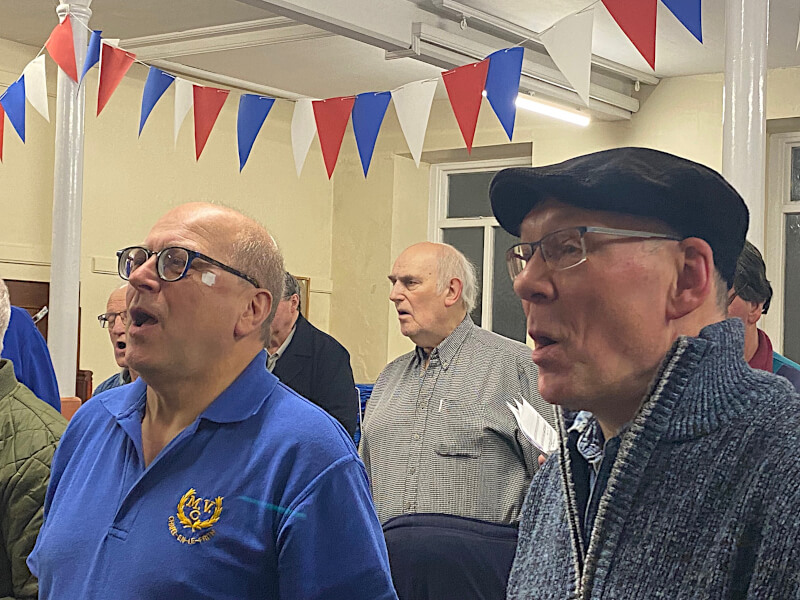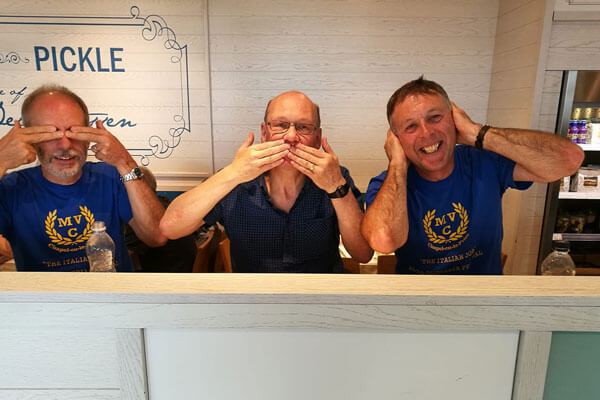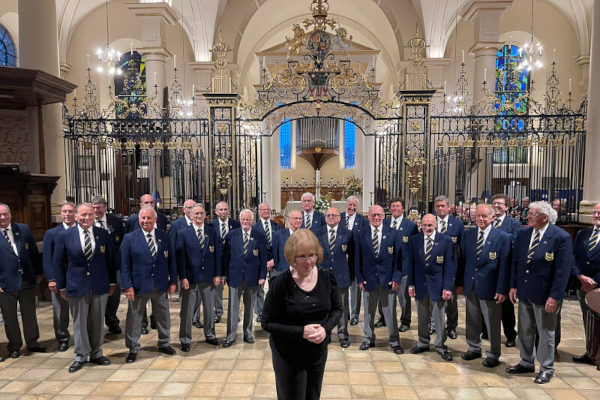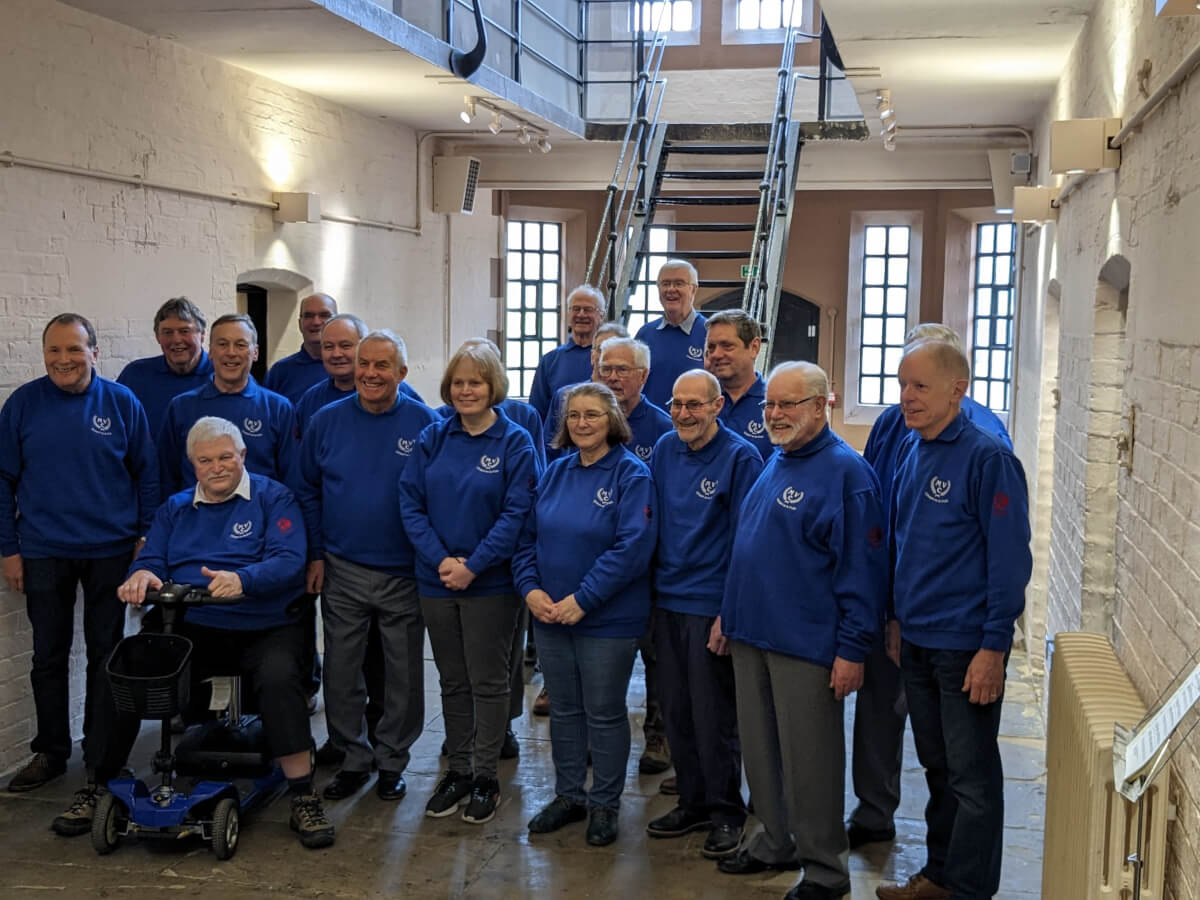Remembering our Founding Fathers
Our Centenary Project

Poster images by kind permission of The Imperial War Museum
from L-R: ART. IWM PST 2763, ART. IWM PST 5255, ART. IWM PST 0314, ART. IWM PST 5139, ART. IWM PST 0334, ART. IWM PST 12456, ART. IWM PST 0321, ART. IWM PST 6096
2018 was CMVC’s centenary year.
In recognition of this historic milestone, and thanks, in large part, to a grant from The Heritage Lottery Fund, we were able to indelibly mark the occasion in two ways.
Firstly, we were able to employ the services of local historian Jonathan d'Hooghe. With Jonathan's expertise and guidance, coupled with extensive research from choir members,
a comprehensive booklet was produced -
A look at the effects on family life in Derbyshire's High Peak during The Great War 1914-1918
(This document is available to download below)
Secondly, we staged three concerts in Glossop, Chapel and New Mills with the theme of World War One. The concerts had a narrative constructed from local research carried out by choir members, which illustrated what life was like for local people both at home and at The Front. The narrative was blended with songs contemporary with the period. The songs themselves were subject to research; some are still familiar today, others are rarely heard these days. The final song in the concert was specially commissioned, again, thanks to The Heritage Lottery Fund grant. Written by Ian McMillan and Luke Carver-Goss, it uses extracts from the research to provide a powerful, touching and fitting end to the concert and the project. The concert performed at New Mills Town Hall on 23 February 2019 was recorded by RAS Audio Services, so we are able to share it with a wider audience.
We dedicate this recording to those men a century ago.
We hope you enjoy.
CONCERT FIRST HALF
CONCERT SECOND HALF
Scroll the poppies below to follow the concert narration

This was a report from a Buxton Advertiser in August 1914:
In London, Trafalgar Square was impassable owing to dense crowds. Continual cheers were raised for King and for England. Outside Buckingham Palace crowds once more collected and sang the National Anthem over and over again. A hostile crowd gathered outside the German embassy and indulged in groaning and hissing. The police had considerable difficulty in restoring order.
A report in the Buxton Advertiser November 1914 reads:
A thousand were asked for and by the end of a fortnight about eleven hundred had come forward. These men are to form the new 6th Battalion of the Sherwood Foresters.
The report continues:
The arrival of the first company was hailed by a great crowd. Opposite the Post Office the men broke out into ‘It’s a long way to Tipperary’. “They’re a fine lot of lads, God Bless ‘em!” an elderly lady with her grandson was heard to exclaim.
This is from the Buxton Advertiser in Aug 1914:
A party of Buxton and Fairfield gentlemen drove to Bakewell for The Show. And in the Rutland Arms Hotel yard their horse was “seized”, a halter put round its neck, the price paid and the trio were left to return in whatever way it pleased them best. It was only one of scores of other incidences.
Also from the Buxton Advertiser Oct 1914:
Some little stir was caused in Chinley on Tuesday when it became known that a man had been given over to the police, being suspected of spying. It appears that he had been observed acting, as it was thought, suspiciously on a train. He had a camera in his possession and the police were informed. Enquiries were made, and it was found that he was an Englishman, and everything was satisfactory. He was, of course, not detained.
A man can work or to battle go,
But the average man, well, he can’t sew;
And, good as men are, from peasants to kings,
It takes a woman to think of thingsThe mother thinks of her bonny son,
The Queen’s mother of everyone,
Her sons are serving her cause in the fray,
She asks her daughters their part to play.For women to fight is - well, not fit.
But women can sew and women can knit,
And many a comfort the needle brings
It takes a woman to think of thingsHer Majesty asked her womankind
To keep the cold of winter in mind;
The cold that is not so badly felt
If you’ve got warm socks and a body belt.For men who lie in the cold and rain
Waiting the signal to fight again,
"Send socks and belts!” the message rings
It takes a woman to think of thingsThe need is now and it must be met,
Before the season of cold and wet,
So buy at once, if your purses permit,
Or else in your parlours sit and knit.There’s no denying the gracious thought
The love of a queen for her men has brought;
And especial value forever clings
To the name of a queen who thinks of things
Pte Standbridge of Buxton wrote from his training camp:
Capt Viner offered a prize of 10 shillings each month for the platoon which could sing best on a route march. We have in our platoon (commonly known by the men “spittoon”) some good singers, I am expecting Kennerley to distinguish himself in this direction. Prior to buglers sounding lights out (9.30) they sang with a heartiness which was quite catching for all to join in.
I am going out with a good heart and confidence, and a strong arm to fight for my King and Country. I have gone to The Front and hope to come back safe.
We have been removed from Sutton on Sea to Gainsborough. The other night however, whilst parading the sands at Sutton, I heard a rustle in the tent where the meat and tea was stored. I made a hiding place in the sand and after about half an hour, I saw a man emerge from the tent in civilian clothes. I could only just discern for the night was very dark. I shouted “Halt! Who goes there?” and the man did not answer. He started running away so I took aim and shot him dead. We had a very merry time afterwards. The man had plenty of money on him, a gold watch, but no papers that would give clues to his name and identity. He, however, was of foreign nationality. We are kept on the look-out every night and are expected to be sent to The Front sometime in January. I should like to have a “pop” at the Germans. I'm expecting to get a medal for the spy business.
We have been in the trenches for 14 days and look like being so for a bit. You must not get upset if you do not get a letter. It is a bit thick here I can tell you. It is over 6 weeks since I had my boots off and is now 15 days since I had a shave. Your loving son, Bill. PS. Received your cake, it was very good. I hope to post your letter today, it's been wrote for a bit.
How I’ve got through has been little short of miraculous. We’ve been in a number of engagements. In the second one our cavalry brigade was practically wiped out. We charged in front of one hundred heavy guns while thousands of infantry kept up terrific rifle fire. The bullets and bursting shells were like rain. Men fell in their dozens. My squadron went into action 180 strong. After our gallop across that awful valley we numbered 70 horse and men. Great praise was bestowed upon the men for their bravery. We were told that the charge was practically a sacrifice to find out the strength and dispositions of the enemy, but at what a cost! Everyone who went through could thank God for having survived such an ordeal.
From the Buxton Advertiser in December 1914:
The children of Burbage Infant School bought the ingredients and two big cakes were made by parents. Enclosed with the cakes was a letter from pupil John Milner aged seven –
‘Dear Soldier, We are sending you a cake and we hope you like it. We hope the Germans won’t shoot you. Thank you very much for going to war to save our lives. With love and best wishes for a happy Christmas and New Year.’
On Christmas Eve both troops were singing to one another and on Christmas morning a German shouted ‘be British and come half-way.’ Our officer went to meet him and the German suggested “You no shoot, we no shoot.” That started the ball rolling. And they all came out and had a spree exchanging souvenirs, of cigarettes, cigars and autographs.
This is an account from the Buxton Advertiser as to what befell him in July 1915.
Pte Bert Longson of Town End, Chapel has been more fortunate than the others. He was severely wounded but the injuries were such as to necessitate the amputation of both legs at the knee. The Chaplain has communicated with Mrs Longson as follows – “I am writing to tell you that your son is going on well and I hope that before very long he will be able to be moved to a hospital in England. I know that you will be glad to hear that he is very comfortable and he is receiving every attention and kindness from the doctors and the nurses. He could not be better looked after. Some of his fellow patients have specially asked me to tell you how they admire his pluck and patience. Your boy is very anxious that you should not worry about him.” Pte Longson is 20 years of age. He has communicated with his mother – “Dear Mother, just a line to prepare you for some bad news. Luckily brother Will was not among us. A big shell dropped in the middle of us killing and wounding twenty. I have had both legs taken off below the knee, so I've done my fighting…” Pte Longson evidently had some difficulty in writing.
Walter Hyde was 19 when war broke out. He recruited for the army at Chatsworth House, along with his brothers Sam, Alf and their friend. They were in the Sherwood Forester Regiment and were taken to Ripon, North Yorkshire for training. Then from there the three brothers and their friend were transferred to Ypres in Belgium, for the battle of Ypres, which was fought from 22nd April - 25th May. On arriving at Ypres all three brothers and their friend were ready to go into battle. Their friend said that he could not kill anyone. I’m sure they were all very scared! The day came that they went into battle, but Walter’s friend who didn’t want to kill anyone, just ran and ran until he was unfortunately shot. While out in the battlefield one day, Alf did not return. My Great Granddad and Sam were very scared and worried, so they went to look for him and they found him and he was fine. While guarding an officer’s tent one day, something tragic happened. My great granddad Walter got his foot blown off! The wound was so bad and because in those days they did not have the medical equipment we have, his foot got infected and he ended up with gangrene. So he was taken back to Norwich where he had his leg cut off. Later on Sam and Alf got gassed. It did not kill them straight away, but it slowly killed them, over the years. My Granddad and Great Uncle Walter told me that the brothers got through the war by singing. They were all in the Birch Vale Male Voice Choir and to raise their spirits they would often sing with fellow soldiers. Legend has it that my great-granddad put his medals in the bin on the outbreak of WW2, saying "What was the point in that!!"
Here is an extract –
This were my first experience of gum boots, which went up to our thighs. We got to the communication trench at dusk and walked along the top some distance as the trench were 18 inches to two feet deep in water. We had not received our gum boots yet but as we got nearer we had to jump into the water as the Germans commenced fire at us. We were the 1st Platoon and we got wet to over our knees. Then we received our gum boots from those we relieved and they had to get wet coming out. What a system! Our Platoon were about 40 strong going in and we came out 3 strong. We had 3 or 4 casualties. The remainder had gone into hospital with Trench Foot. The first night in those trenches I shall never forget. It were worse than all the fighting I ever saw. Until I got dry I shivered until every bone in my body ached. I were glad to splash about in the trench with my gum boots on to try and get warm, but it were an hopeless task. The only relief I could get were to climb up on some ammunition boxes, take my boots off in turn and rub my feet with a couple of dry sandbags I'd got. These two sandbags were my best friends for the time being. It were a lot of trouble with everything being so wet and muddy but it saved my feet.
When my pals asked me what made me go this way or that way I used to reply “I just follow me nose”, which I find is the best answer I could give you today. I wonder sometimes if it was a guiding spirit. Some will say it’s just my luck but it happened too often. When I were on my own running from shell hole to shell hole I used to sing “Lead Kindly Light” in my head. It always made me feel safe.
the Buxton Advertiser of February 1915 carries this report on a newly formed “Bantam Battalion” of the Sherwood Foresters:
Men who have previously been rejected on account of height standards can now be accepted. The minimum height is 5ft, maximum 5ft 3in and chest minimum expanded 34 inches.
An official intimation reached Nottingham that the War Office has sanctioned an important change regarding recruits and defective teeth. Men will now be allowed to be attested if otherwise fit and willing to undergo dental treatment.
Here is an extract of a letter from a Tideswell resident typical of the sentiment shared by many:
I will not use the mild term of shirkers to them, but I will correctly designate them as what they are – cowards. In conclusion, we have a Roll of Honour and I would respectfully suggest that we should have a roll of cowards placarded at every bill posting situation.
The regiment we relieved lost one, killed, 15 wounded and 125 frost bitten men lying in the village unable to walk. They have been kept in the trenches 24 hours at a stretch and we heard with some satisfaction that we were only to be in the trenches 12 hours at a time. The whole trench was lying three feet in water at its shallowest places and we either had to stand in this all night for safety or lie a little way out of the trench if we did not want so much water and take the chance of being hit by the Germans. Standing in a trench with water well over one’s knees all night is no joke. Luckily it did not rain. It is some consolation to know that their trenches must have been as bad as ours. On our way back they'd send rockets up into the air to show us up to them. We had to lie down in the mud every time they did this. These rockets is the same as they use in fireworks. I, for one, shall not appreciate this so much in the future. It took me 2 to 3 hours to feel my legs again.
Dear Mrs White, I regret to say that your son No 16406 Pte John White was killed in action on November 1st. Offering my deepest sympathy I remain yours faithfully, R Colgate Sgt. PS – A parcel having been received this day has been divided among his comrades.
Picture a long cellar over an arched roof – an underground storage space for barrels of beer. Of the large building that once stood proclaiming itself the Brasserie of the village, a series of such cellars is all that remains. The heaped up debris overhead renders our refuge practically shell-proof and fortunately so, for tonight the enemy’s artillery is particularly active. A steady downpour of rain ruffles the temper of my billet guard and as each man returns he mutters his opinion of the weather, and all sorts of things. A drop of hot tea prepared by his resting comrades over our bucketful of fire soon restores him, and then he calmly and simply remarks "The night is a dirty one”. Around the fire we sit, my platoon and I, our rifles, clean as new pins and well oiled, rest along the walls, and, given an alarm, we can be on the move in two minutes – an efficient unit ready to meet any demands. We cannot lie down to sleep for we know we must be ready to move and act on the instant. So we sit round our cosy little handful of fire and we sing. What do we sing you may wonder? Well naturally our thoughts are in keeping with the season and we sing of Christmas and of home. We sit and sing Christmas carols – Old King Wensislas and Noel are popular. Then someone suggests music hall ballads which can be remembered and so we sing The miner’s dream of home, Two little girls in blue, Honeysuckle and the Bee. Presently someone timidly commences singing Home, Sweet Home. And we half laugh, you know, that uneasy laugh that you force when you try and persuade yourself that you don’t want to cry – but we sing, softly and feelingly, our voices vibrating with emotion as our minds dwell on favoured memories.
INTERVAL…
Here's an article from the Buxton Advertiser 1915:
Under the strain of war-time, thousands of people are unconsciously approaching a breakdown. Their forces are being burned out without being replaced. To meet this situation the late Surgeon General of HM Forces, Sir William Taylor, now directs the production of Sanaphos the new addition to the diet which counteracts the effects of this strain. Sanaphos is of course all British. It completely supersedes the German preparation Sanatogen and its many imitations. Sanaphos!
Home in every sense of the word to this war-torn Tommy home on leave. In place of the general rush and discomfort of an ordinary wash day he finds a bright little wife doubly happy in the joy of his visit, and in the knowledge that by merely soaking his clothes in cold water and Rinso the clothes have washed themselves, enabling her to devote all her time to his comfort and every need.
In November 1915 the Buxton Advertiser carried, in equal prominence, separate reports on the deaths of two local men killed in action, the wounding of another and the results of a ploughing competition in Bamford.
And in January 1917 at a point when British military deaths were reaching around 400,000, the High Peak News had this report:
A girl who lives on Church Brow, in Chapel, was toboganning down that hill on Saturday when she came to grief. She dashed across the main street at the bottom of the brow and into the window of the Victoria Café, which was smashed, and the girl was slightly hurt.
Edward Yates
Son of Frederick James and Mary Yates of Bolt Edge Farm, Dove Holes. He was a private with the 2nd Battalion Sherwood Foresters. Killed in action on Tuesday 5th October 1915, aged 16. Now rests in a cemetery in Ypres in Belgium. I was told by Edward’s sister (my mother) that Edward, her youngest brother, on seeing many of his local friends and neighbours marching off to Chesterfield from Chapel, passing his father’s farm just below Sparrowpit, he wanted to join them but was underage. So against his father’s wishes, he hid his better clothes in a barn close to the road, then late one evening or early the next day he set off to sign up for the King’s Shilling giving his age as 18. When the family found out they begged my grandfather to intervene but he said "He’s made his bed and he must lie in it.’ A sergeant from the same battalion who visited my mother after the war said “He could not keep his head down in the trenches and was shot by an enemy sniper.” His name is recorded not only on his gravestone but memorials in various places. And at my last count, over seven of these memorials.
By 1918 there was food rationing and this article in the Buxton Herald and Gazette:
The RSPCA humane killer has been adopted by the military authorities for slaughtering horses at the Metropolitan Cattle Market. The horses are to be used for human consumption.
Two women in a food queue in a working class district were talking about horse beef. “My husband” says Mrs A to Mrs B “swears he won’t touch it” “So does mine, but he’s eaten it twice without knowing it, and if there’s no other meat to be had tonight he’ll get it again!"
Corn is wanted to feed the nation not the birds. Corvusine D G keeps away the birds, rooks, pheasants and pigeons. Make sure you get a harvest from every grain sown.
A host of insects are advancing from a northerly direction over a frontage of five or six miles. The Peak District, Edale and part of Chapel are already invaded, and there will be very serious loss to farmers and allotment holders and the public generally, unless energetic action is taken without a day’s loss of time. A correspondent has written to say that the plague was caused by the mass killing of birds and until the order to kill birds was revoked it would continue.
Here is an article from the Glossop Chronicle for August 1918:
Next week the majority of inhabitants, war weary and completely tired by the strenuous exertions of the past 12 months will be off in crowds to seek health and strength in fresh fields and pastures new. There is no denying folk have been working at high pressure and long hours and despite the dark clouds it is essential that minds and bodies should have much needed rest. We understand that the through train to Blackpool has proved how great demand is for a short stay at this queen of all health and amusements resort and we only hope holiday makers will be favoured with fine weather.
From the Buxton Advertiser in November 1915:
Necessity is a creator itself. And at Chapel en le Frith the lack of men is being keenly felt. A lady, Miss M Chapman, engaged at the Post Office, has patriotically offered her services. The instance must be unique in the postal history of the old Peak Capital but it reveals that an excellent spirit still imbues this old country. Miss Chapman takes the morning delivery and commences at about 6.30 finishing at about 9 o’clock. We are informed that the letters are delivered most expeditiously, and on this all will heartily congratulate Chapel’s latest postal recruit.
There is now urgent need of women over 20 years of age for motor tractor work. The terms offered are free training, outfit, and travelling expenses. After training the wages will be 25s a week for the first 2 weeks, 30s per week for the next 2 weeks then a regular salary of 30s with a bonus of 1s per acre ploughed.
The turn has come for the married woman who cannot work outside her home to take a man’s place. Every woman whose husband has a little shop or a little business owes it to him and her country to spend time before he is called up in learning to carry on in his place. Millions of French women have done this – and what French women have done, English women can do when the need arises. It was easier for them than for us because Frenchmen have always had the habit of talking over business affairs with their wives. English people have been inclined to make out that there was something mysterious and difficult about keeping a small business going and that women would be sure to make a hash of it. Perhaps they cannot be the best possible grocers but England has come to a time when the best of everything is wanted for the army. The second best kind of grocer is good enough for us.
Here is an extract of a letter from a Buxton nurse:
We are very busy and have not nearly enough nurses. As to comfort, we are much better off than the others in this respect, but of course one does not expect comfort. If one can get through the necessities of life one is thankful. The wounded come here straight from the trenches. The poor things have to travel a long journey on a train, packed like sardines, so you can imagine they are nearly dead with fatigue and other sufferings. Sometimes we get as many as 150 at a time, sometimes 50 come. They are nearly all French, Turks, Algerians or Germans. I have been for 7 weeks on night duty, I have 80 beds to look after and am on duty for 12 and half hours at a stretch, although often longer. We have no hot water yet and no gas. The place is lighted by electricity which just goes out when one most wants it.
Here’s one from the Buxton Advertiser in 1918:
Application for a coal porter to be exempted: This man was 41 years of age and married. The employer’s statement was to the effect that the man was fully employed in the retail coal trade and it was impossible to get a man over military age to take his place.
This man fills the bags, weighs them and puts them on the lorry. Bagged coal is particularly supplied to poor people who would suffer if he could not be replaced.
“Couldn’t a man with a wooden leg do it?”
“We have a hunch-back, a man with a wooden leg and a deaf and blind man, but this is the only man I could send to your house to get a load of coal in and yours is not as difficult as some.”
“How many boys have you?”
“We have two but they’re only fit for chopping sticks.”
A boy couldn't lift a bag of coal off the scales and put it onto a lorry.” The application was refused.
Here are the headlines from one page of the High Peak Advertiser in June 1918 –
Pte Stokes of Glossop dies of wounds;
Glossop Lads prisoners in Germany;
Soldier’s suicide at Glossop;
Another Glossop hero dies from wounds;
Splendid effort for Glossop’s wounded soldiers – cricket match realises £50.
There are instances of men returning from The Front suffering nervous breakdowns.
Here is another article from the High Peak Advertiser:
Derek Boardman
On Tuesday morning a soldier in hospital gown was found floating in the reservoir at Dinting. He was identified as William McMath who was being treated for an injured arm at Ashton military hospital. At the request of one of McMath’s fellow inmates, Alexander McDonald gave evidence. The coroner asked McDonald if he knew of any reason why McMath should take his own life. McDonald said…
"He used to tell me that he'd stuck a German through the neck with his bayonet, and was preying on his mind. He used to imagine that he saw him in his sleep. And he was continually worrying about it, and that, in my opinion, is why he did it."
Here’s an article from the Buxton Herald and Gazette from September 1918:
Rout Rodents! Millions of mice and rats are robbing us of food. Every mouse and every rat must be regarded as a menace to the nation’s larder. A mouse in your cupboard nibbling your bread and cheese, and a rat in the stack stealing your corn, are both of them helping the Germans.
The Buxton Herald and Gazette of the 2nd November reported:
The Munitions Parliamentary Secretary says that if there be not work for everyone after the war the women must stand aside and make way for the men who come back. And so say all of us! The men from The Front must be in front of the queues of civilians whether it is a question of work or pay, or food or fuel.
This report from the Buxton Herald and Gazette is typical of how the armistice was greeted:
The children cheered deliriously and the occasion was such as to make an impression on their minds that they will never lose. The band played 'Tipperary', Keep the Home Fires Burning and other popular songs after which they formed into one huge procession such as was never seen before. The spirits of one and all were “top hole”. The celebrations continued well into the late evening.
This next song, a parody of the Jerome Kern love song, They didn’t believe me, illustrates the point. Entitled: We’ll Never Tell Them
Here is an account of the choir’s beginnings written in 1979 by Bert Longson, at that point the only surviving founder member -
One night after I had been to choir practice at Town End Wesleyan’s church, I was talking to George Muir, Joe Lomas and Joe Pearson at the bottom of the schoolyard. Then we started singing and a schoolmaster who was staying with Alice Middleton came across the road and said “With voices like that you ought to be able to form a male voice choir.” So we went round all the ex-servicemen. Amongst them was Sam Ibbotson and Tom Sidebotham and we went carol singing. We gave the money collected to the Amateur Dramatic Society which was effective in starting the amateur players. After a while we couldn’t carry on as we were losing members, so we threw it open and three dear friends of mine, Alf King, Joel Potter and Wilton Ward joined us. By the way, Mrs Tom Shepley was our first accompanist and Tom Longson, my uncle, was our first conductor.
A LOOK AT THE EFFECTS ON FAMILY LIFE IN DERBYSHIRE’S HIGH PEAK DURING THE GREAT WAR 1914-1918
by Jonathan d'Hooghe


Genuine postcards printed by Bamforth & Co Ltd of Holmfirth
Join Us
- Do you enjoy social events?
- Like to learn something new?
- Like a proper challenge?
We are confident you will join the whole experience. The choir are extremely friendly and there is no need to audition - we let you learn at your own pace.
When you experience the thrill of singing with other people you will be glad you took those first steps.
Dove Holes Methodist Church, Monday evenings at 7.30pm.

In full voice
Hire Us
- For family events
- For special occasions
- For social gatherings
We are available to hire for individual concerts, private functions, weddings and funerals, indeed any gathering where music is required.
Our rates are very reasonable.
Joining the choir
Many men think they can't sing, won't be as good as the others, don't like their voice, are afraid of trying something new, are reluctant to attempt a new skill in front of others or think they need to understand music. We embrace all those fears and doubts and we are offering to train you.
Everyone was once a beginner. You don't need any musical knowledge or experience and you won't be asked to sing solo. It is quite alright to be a bad singer (chances are you won't be) before you learn to become a good singer; never be frightened or feel you are not good enough.
If you sing in the car or shower you are on the right track, so come along and give it a go.
The name can be off-putting can't it? For many people, 'Male Voice Choir' evokes images of men standing on a windy hillside singing Men of Harlech. Chapel Male Voice Choir is not like that.

No auditions are necessary

Under the baton of the M.D.
Not only is our music diverse - spanning everything from Faure to Les Miserables - but the diversity of our members' ages and interests means that CMVC has something for everyone.
If you are male, enjoy singing and good company, we would urge you to consider becoming a member of the choir.
Just bring enthusiasm and a willingness to learn. If you decide to give it a go (you can do so without any initial commitment) you will receive a warm welcome, and plenty of support.
We will supply you with CDs or MP3s to learn from and you will be assigned a designated member of the choir to give advice and help when needed. Though some choir members do read music, many don't and that doesn't matter at all as pieces are learnt note by note.
Rehearsals are held every Monday evening at 7:30pm at Dove Holes Methodist Church ( SEE MAP ABOVE ) and last for two hours.
A brief history of the choir
The Choir was formed in 1918 by young men returning from the Great War, and was originally known as Chapel en le Frith Ex-Servicemen’s Choir – although soon afterwards it widened its membership base and became Chapel en le Frith Male Voice Choir. The first long serving conductor was Tom Longson, who held the position for thirty years, until 1949.
During World War II, CMVC’s membership was much reduced as many members were away on active service, but the choir still managed to stage a number of fundraising concerts for charities such as TOC H, with very well-known singers of the day such as Dame Isobel Baillie, Heddle Nash and Norman Allin.
In 1951 the choir appeared on Wilfred Pickles’ radio show Have a Go and continued its commitment to concerts in the High Peak area - by its 50th anniversary in 1968, CMVC was giving thirty concerts a year.
In 2015 the choir even appeared on the BBC TV series Pointless when a choir member appeared on the show. When he was stumped, he gave the choir as an answer, and hey presto! fame for the choir on national TV.
Membership has fluctuated since the '70s, but the choir has developed strongly from the beginning of the 21st century and, as we move into its second century, the choir’s numbers are in rude health and fine voice. Under the musical direction of Alison, and ably accompanied by Celia Maylor, we look forward to the next 100 years!

Our Pointless claim to fame!

And here we are...

In all our glory

Singing INSIDE a Kelpie















